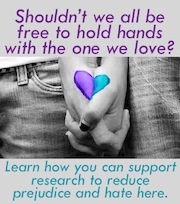To hold or not to hold…hands, that is. When you’re in a relationship, are you a hand-holder, or do you prefer to keep your hands to yourself? Perhaps you find your hand gets too sweaty when in the embrace of another, or maybe you only hold hands seasonally when doing so will provide you with an extra bit of needed warmth in the deep freeze of January. Wherever you fall on this spectrum of loving to hold hands or avoiding it like the plague, imagine for a moment that it wasn’t up to you whether or not you could hold hands with your partner. Perhaps, if you hate to hold hands anyway, your response to such a scenario would be a sense of relief. But if you fall on the other side of the spectrum, where you love to walk hand in hand with your partner, you’re probably a bit confused and baffled as to why this simple and personal decision could be taken away from you. Such may be the case for marginalized couples, for whom PDAs may bring unwanted attention, stigma or even violence. Could avoiding PDAs have potential health implications?
Beyond the physical comfort of holding a partner’s hand or the potential benefit of added warmth in the winter, are there other potential benefits that couples who avoid holding hands could be missing out on? A number of research studies have found positive health outcomes associated with hand holding and physical affection shared between partners. Women who received neck and shoulder massages from their male partners responded to stressful experiences with lower levels of cortisol excretion (a hormone that we excrete when we are stressed), and lower heart rates, both of which have positive health implications. In another study, women in mixed-sex relationships reported lower blood pressure levels when they experienced more frequent hugs from their partners. A third study placed women inside of an MRI machine and threatened them with electric shocks. Women who held hands with their partners during this experience subsequently showed improved emotional regulation in the face of the threat, as detected by reduced reactivity within the brain. In other words, women holding hands with their husbands during a stressful event were better able to control their feelings and physical responses to feeling threatened. Furthermore, this study found that the effect was stronger when women held hands with their partner, as opposed to a stranger, and that the effect was strongest when relationship quality was higher.
So it would appear that physical affection between partners, including holding hands, can help people to respond better to stress. But what about when holding hands IS the stressor? Although same-sex couples who avoid holding hands may be missing out on some of the positive benefits of shared physical affection, same-sex couples who DO hold hands may experience conflicting emotions, such that an activity that is supposed to reduce their stress responses actually creates a stressful situation! Furthermore, it may be difficult to quantify the potential health benefits of holding hands compared to the potential health benefits of avoiding physical harm, imprisonment or death. While qualitative research has established that many same-sex couples do either avoid holding hands in public or experience additional stress when doing so, no research has yet looked at the actual physical health outcomes of hand holding within same-sex couples.
New research on public displays of affection is attempting to determine whether same-sex couples have the same access to the potential health benefits of PDAs as non-stigmatized couples. There are a number of reasons to suspect that they may not. For many people around the world, holding hands with their partner is not an option, no matter how much they want to because if they were to be caught they could face physical danger, end up in jail, or even be executed. In Russia, it is now illegal for same-sex couples to hold hands and doing so can lead to imprisonment and hefty fines. In Nigeria, same-sex couples holding hands can face up to 10 years in prison and in Uganda, similar displays of affection could lead to legal execution if a controversial bill is passed that allows “aggravated homosexuality” to be punished by death. Even without the risk of these extreme legal penalties, many same-sex couples avoid holding hands because they fear the potential repercussions from doing so in front of the wrong person at the wrong time. Such fears are not irrational. Just recently in New York City, two men holding hands after leaving a movie theatre in Chelsea were violently attacked by a group of men yelling anti-gay slurs. This was just one attack in a series of anti-gay hate crimes that have stricken New York City in 2013.
As part of a series of three studies on public displays of affection in same-sex couples, I’ll be examining the physiological responses to hand holding in both mixed-sex and same-sex couples. Do both types of couples experience health benefits as a result of holding hands, or do same-sex couples have more difficulty in accessing potential health benefits due to the stigma associated with same-sex physical affection? The second study, which I invite you to become a sponsor of, will be examining the other side of this story by trying to understand exactly what goes on in the minds and bodies of individuals who witness same-sex PDAs. In other words, what makes people go from seeing gay, to seeing red? To find out more about this research, please visit http://www.wecanholdhands.com - because ultimately, everyone should have the right to hold hands with the person they love.
Follow:
If you enjoyed this post, consider becoming a KLB Research Patron to help support our research and our ability to disseminate our results in accessible and free formats!
For the Fact Checkers:
Ditzen, B., Neumann, I.D., Bodernmann, G., von Dawans, B., Turner, R.A., Ehlert, U., & Heinrichs, M. (2007). The effects of different kinds of couple interaction on cortisol and heart rate responses to stress in women. Psychoneuroendocrinology, 32(5), 565-574.
Light, K.C., Grewen, K.M. & Amico, J.A. (2005). More frequent partner hugs and higher oxytocin levels are linked to lower blood pressure and heart rate in premenopausal women. Biological Psychology, 69(1), 5-21.
Coan, J.A., Schaefer, H.S. & Davidson, R.J. (2006). Lending a hand: Social regulation of the neural response to threat. Psychological Science, 17(2), 1032-1039.
Rostosky, S.S., Riggle, E.D.B., Gray, B.E., & Hatton, R.L. (2007). Minority stress experiences in committed same-sex couple relationships. Professional Psychology: Research and Practice, 38(4), 392-400.
Aravosis, J. (July 1, 2013). Russia’s Putin signs draconian anti-gay law banning speech, rainbows, holding hands. AmericaBlog.
Nigeria: New Law Bans Gay Marriage.
Funk, L. (2013). Uganda Kill the Gays Bill: Everything you need to know about anti-gay bill. Policymic.
Rostosky, S.S., Riggle, E.D.B., Gray, B.E., & Hatton, R.L. (2007). Minority stress experiences in committed same-sex couple relationships. Professional Psychology: Research and Practice, 38(4), 392-400.
Prokupecz, S. & Rosendale, G. (August 15, 2013). Gay couple holding hands attacked after leaving Manhattan movie theatre. 4 New York.






